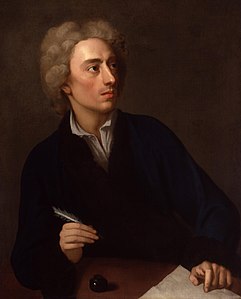Analysis of The Challenge: A Court Ballad
Alexander Pope 1688 (London) – 1744 (Twickenham)
I.
To one fair lady out of Court,
And two fair ladies in,
Who think the Turk and Pope a sport,
And wit and love no sin!
Come, these soft lines, with nothing stiff in,
To Bellenden, Lepell, and Griffin.
With a fa, la, la.
What passes in the dark third row,
And what behind the scene,
Couches and crippled chairs I know,
And garrets hung with green;
I know the swing of sinful hack,
Where many damsels cry alack.
With a fa, la, la.
III.
Then why to Courts should I repair,
Where's such ado with Townsend?
To hear each mortal stamp and swear,
And every speech with 'Zounds' end;
To hear them rail at honest Sunderland,
And rashly blame the realm of Blunderland.
With a fa, la, la.
IV.
Alas! like Schutz I cannot pun,
Like Grafton court the Germans;
Tell Pickenbourg how slim she's grown,
Like Meadows run to sermons;
To court ambitious men may roam,
But I and Marlbro' stay at home.
With a fa, la, la.
V.
In truth, by what I can discern,
Of courtiers, 'twixt you three,
Some wit you have, and more may learn
From Court, than Gay or Me:
Perhaps, in time, you'll leave high diet,
To sup with us on milk and quiet.
With a fa, la, la.
VI.
At Leicester Fields, a house full nigh,
With door all painted green,
(A Milliner, I mean);
There may you meet us three to three,
For Gay can well make two of Me.
With a fa, la, la.
VII.
But should you catch the prudish itch,
And each become a coward,
Bring sometimes with you lady Rich,
And sometimes mistress Howard;
For virgins, to keep chaste, must go
Abroad with such as are not so.
With a fa, la, la.
VIII.
And thus, fair maids, my ballad ends;
God send the king safe landing;
And make all honest ladies friends
To armies that are standing;
Preserve the limits of those nations,
And take off ladies' limitations.
With a fa, la, la.
| Scheme | abcbcccD efefggD ahihxibD jxkxkllD jmnmnooD aaffnnD jpqpqeeD jrsrskkD |
|---|---|
| Poetic Form | |
| Metre | 1 11110111 011100 11010101 010111 111111010 111010 10111 11000111 010101 10010111 010111 11011101 110111 10111 1 11111101 1101110 11110101 01001111 1111110100 0110111 10111 1 01111101 1101010 111111 111110 11010111 1101111 10111 1 01111101 1100111 11110111 111111 010111110 111111010 10111 1 11010111 111101 010011 11111111 11111111 10111 1 11110101 0101010 10111101 0011010 11011111 01111111 10111 1 01111101 1101110 01110101 1101110 010101110 01110010 10111 |
| Closest metre | Iambic trimeter |
| Characters | 1,725 |
| Words | 342 |
| Sentences | 28 |
| Stanzas | 8 |
| Stanza Lengths | 8, 7, 8, 8, 8, 7, 8, 8 |
| Lines Amount | 62 |
| Letters per line (avg) | 21 |
| Words per line (avg) | 5 |
| Letters per stanza (avg) | 166 |
| Words per stanza (avg) | 42 |
Font size:
Submitted on May 13, 2011
Modified on March 05, 2023
- 1:43 min read
- 82 Views
Citation
Use the citation below to add this poem analysis to your bibliography:
Style:MLAChicagoAPA
"The Challenge: A Court Ballad" Poetry.com. STANDS4 LLC, 2024. Web. 28 Apr. 2024. <https://www.poetry.com/poem-analysis/500/the-challenge%3A-a-court-ballad>.


Discuss this Alexander Pope poem analysis with the community:
Report Comment
We're doing our best to make sure our content is useful, accurate and safe.
If by any chance you spot an inappropriate comment while navigating through our website please use this form to let us know, and we'll take care of it shortly.
Attachment
You need to be logged in to favorite.
Log In